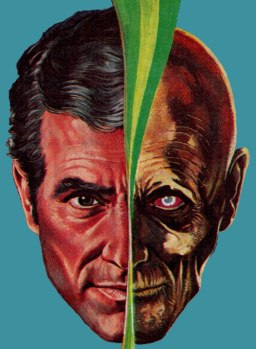Who was that Soviet composer I saw you with last night?

Believe it or not but there was a time when Arthur C. Clarke was not yet a famous science fiction author. Way back in the late thirties he was merely known as an aspiring author and genius who had been nicknamed ‘Ego Clarke’ by his good friend William F. Temple. Why ‘Ego’? Something to do with Arthur C. Clarke being very sure of himself I believe. I’m reminded of a an exchange between Bill Temple and Arthur’s brother that occurred during Clarke’s first visit to the USA. While out on a late evening stroll Arthur’s brother exclaimed in horror that Arthur had forgotten to take the Moon with him. Bill Temple assured him that everything was fine, that Arthur had a US edition over there. You simply don’t make that sort of joke about an unassuming friend. (For more about the Temple/Clarke relationship please read Temple of the Sphinx.)
However ‘Ego Clarke’ wasn’t always the victim. He clearly had a whimsical side to him that at times manifested itself in rather unexpected ways. For instance when Alexandr Mosolov’s infamous orchestral piece, Iron Foundry: Music of Machines, was released in the UK as a ten-inch 78rpm record Clarke enthusiastically added it to his collection. Did he actually enjoy Mosolov’s unique approach to music? Hard to say because he did seem to use that record more as an instrument of war than as entertainment. Consider the following description of an evenings entertainment put on for the London Branch of the Science Fiction Association. According to a report in the March 1938 issue of Novae Terrae the February meeting started off with Walter Gillings reading out aloud Lovecraft’s Colour Out of Space. This then was followed by a musical interlude arrange by Ego:
‘His audience sat enthralled, then interested, then passive, then replete, then a little fidgety. After 1½ hours heroic reading without a stop Mr Gillings drew his story to a finish. Grunts and deep sighs sounded from about the table, of ecstasy or relief. The big moment then arrived – a programme of sf music offered by Arthur Clarke. Several faces became stonily resigned as the handle was wound, and as the first notes of Things To Come thundered out, eyes wandered to papers and magazines. And then as the maddening rhythm of Mosolov’s Steel Foundry slammed and roared across the frosty air eyes became expressive once more, but alas, only with amusement and disgust…’
Ninety minutes of Lovecraft followed by a blast of Mosolov? Never has the headline NOT MANY DEAD ever been more appropriate. (Personally I love Iron Foundry but I believe mine is a minority opinion.)
Anyway, according to one of his contemporaries, science fiction fan and artist Harry Turner, Clarke was a repeat offender:
‘Arthur took great delight in playing the Mosolov piece at full volume to impress unsuspecting visitors (I was one!) to the 88 Grays Inn Road flat that he shared with Maurice Hanson and Bill Temple.
A few years later I spent some time in Arthur’s company at RAF Yatesbury, to find myself roped in to help at several wartime record recitals that Arthur busily organised as part of the camp entertainment. While Mosolov didn’t feature in these programmes, I found that Arthur still liked to operate at maximum volume, blithely ignoring all protests from wilting listeners in the front rows…’
This I submit proves that restraint was not an idea the youthful Clarke was especially familiar with. And now I’ve put that put that thought into your head try to remain calm as you read this poem which appeared in the April 1938 issue of Novae Terrae:
‘PRELUDE TO THE CONQUEST OF SPACE
by Arthur C. (Ego) Clarke
I shot a rocket into the air,
It fell to earth I know not where,
But 50 grammes of TNT,
Exploded in the Rectory.I shot a rocket into space,
Toward the full moon’s beckoning face,
And was rewarded for my pains,
By blowing up the Sea of Rains.I shot a rocket into the air,
But notwithstanding all my care,
Five hundred tons of dynamite,
blew San Francisco out of sight.’
Such cheerful exuberance and utter disregard for consequences. I can’t help but imagine this as an early draft by Tom Lehrer. Perhaps it’s for the best that nobody put Clarke in charge of Britain’s rocket defences. I do feel that rockets and unbridled enthusiasm are best not combined…

One thought on “The Young Arthur Clarke”